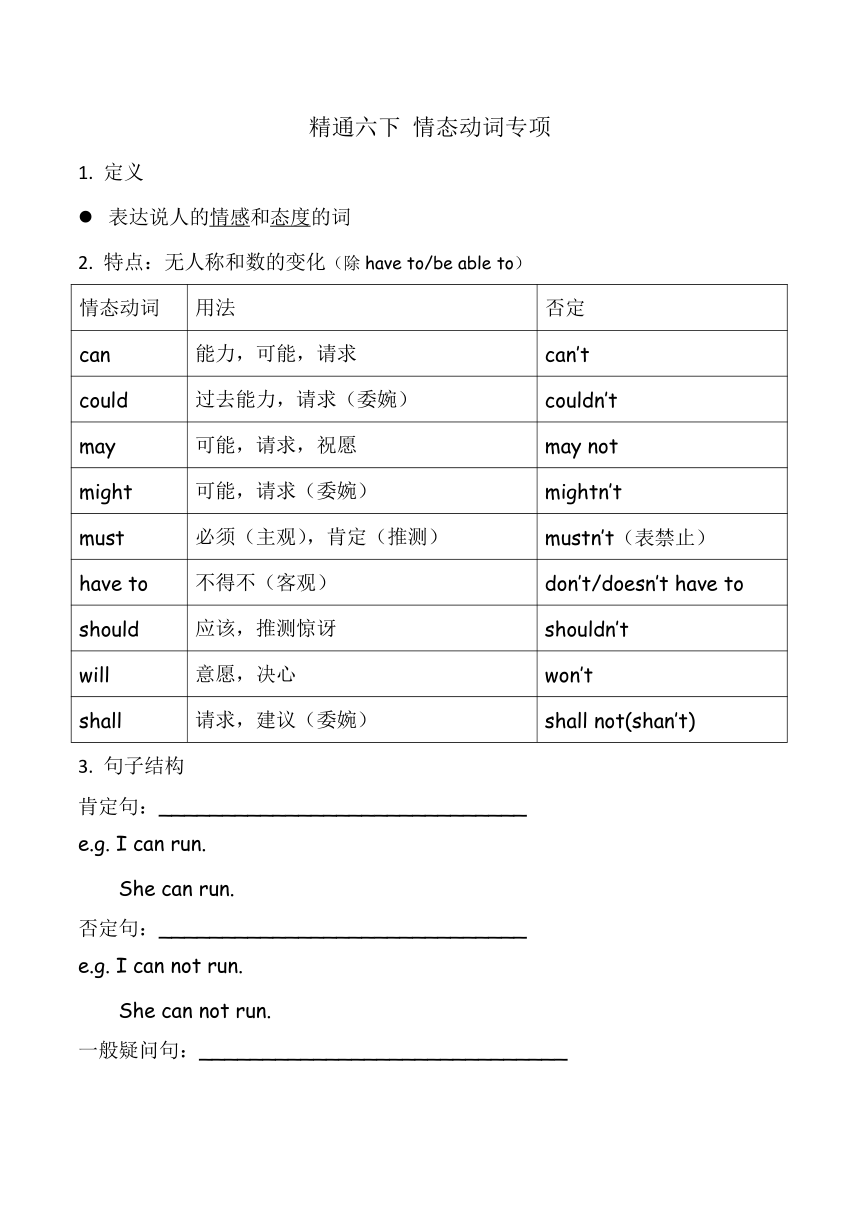
精通六下 情态动词专项 定义 表达说人的情感和态度的词 情态动词 用法 否定 can 能力,可能,请求 can’t could 过去能力,请求(委婉) couldn’t may 可能,请求,祝愿 may not might 可能,请求(委婉) mightn’t must 必须(主观),肯定(推测) mustn’t(表禁止) have to 不得不(客观) don’t/doesn’t have to should 应该,推测惊讶 shouldn’t will 意愿,决心 won’t shall 请求,建议(委婉) shall not(shan’t) 特点:无人称和数的变化(除have to/be able to) 句子结构 肯定句:_____ e.g. I can run. She can run. 否定句:_____ e.g. I can not run. She can not run. 一般疑问句:_____ e.g. Can you go Yes, I can. No, I can’t. Can she go Yes, she can. No, she can’t. (tip: 横线处填写句子结构,学生通过例句自己总结出句子结构) 情态动词练习题 我们小学阶段常见的情态动词有:_____ 一、情态动词后面接动词原形,不受人称、数量、时态的变化影响。 1.I can _____(dance) very well. 2.She could _____(sing)five years ago. 3.We must _____(go)back to school now. 4.He must _____(look after)his little baby. 5.You may _____( pick) apples this Monday. 6.They should _____(go)to bed before nine o'clock. 7.She will _____(have) an English lesson tomorrow. 8.Tom would _____ (like) a hamburger. 二、改否定句,直接在情态动词后面加not。虽然must是表示“必须”的意思,但是用于否定式时,mustn't却表示“不要、不能、禁止”的意思,而不是表示“不必”。 1.I can dance very well. I _____ dance very well. She could sing five years ago. She _____ sing five years ago. We must go back to school now. We _____ go back to school now. He must look after his little baby. He _____ _____ look after his little baby. You may pick apples this Monday. You _____ _____ pick apples this Monday. They should go to bed before nine o'clock. They _____ _____ go to bed before nine o'clock. She will have an English lesson tomorrow. She _____ have an English lesson tomorrow. Tom would _____ (like) a hamburger. Tom _____ _____ like a hamburger. 三、变一般疑问句,只需将情态动词提前,you是第二人称,要把主语改成I或者we。 1.I can dance very well. _____ _____sing very well Yes, _____ _____. No, _____ _____. 2.She can sing five years ago. _____ _____ _____five years ago Yes, _____ _____. No, _____ _____. 3.They should go to bed before nine o'clock. _____ _____go to bed before nine o'clock Yes, _____ _____. No, _____ _____. 4.She will have an English lesson tomorrow. _____ _____have an English lesson tomorrow Yes, _____ _____. No, _____ _____. 四、对划线部分提问,先把划线部分用疑问词代替,剩余部分改成一般疑问句。 1. I can dance very well. _____ can _____ do She can sing five years ago. _____ can she _____ five years ago They should go to bed before nine o'clock. _____ should _____ go to bed He must look after his little baby. _____ must _____ look after She will have an English lesson tomorrow. _____ will she _____ tomorrow ... ...
~~ 您好,已阅读到文档的结尾了 ~~